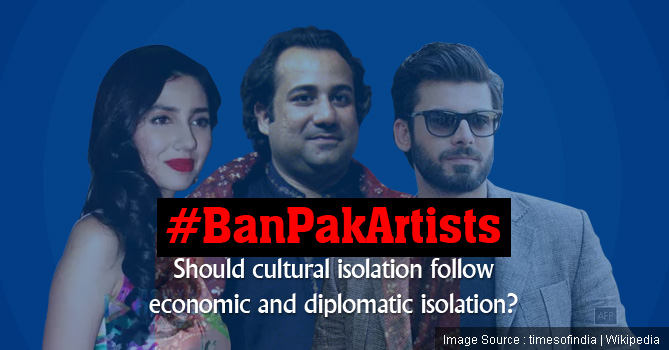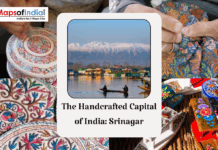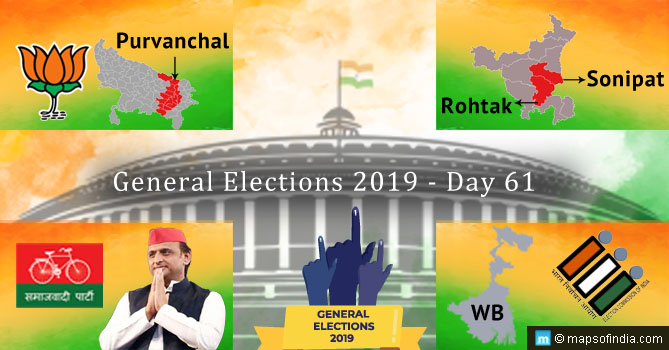For years now, veiled attacks and state-sponsored terrorism have been the calling cards of our western neighbour. Our nation and its valiant armed forces have been bleeding and bleeding slowly through the northern and western frontiers. But we should be content as long as we get a regular fix of gyrating Pakistani artistes in glitzy Bollywood events and crooning Pakistani singers in candlelight ghazal mehfils. Despite everything, holding cultural exchanges is imperative, irrespective of the fact that the nation you are hosting is perpetrating violence in your motherland. Art and niceties must be exchanged at all costs. At least this is what some would have you believe.
“Artistes Are Not Terrorists”
Indeed. We in India, have the highest regard for artistes. Art and connoisseurs of art from across the world have always been made welcome in our country. We have celebrated cross-cultural exchanges and played warm hosts to artistes from Pakistan since time immemorial. So much so that one cannot imagine the Indian musical landscape without the likes of Nusrat Fateh Ali Khan, Mehdi Hassan, Ghulam Ali, Abida Parveen, Rahat Fateh Ali Khan, Shafqat Amanat Ali, Adnan Sami, and Atif Aslam. If only Pakistan had remained content with sending across these musical wonders. Or even actors like Fawad Khan, Mahira Khan, Veena Malik and Javed Sheikh.
Pakistan, however, insists on sending across the likes of Kasab, Bahadur Ali and Masood Azhar as well. In 2014 – 2015, there have been a total of 322 cross-border infiltration attempts by terrorists from Pakistan. The surgical strikes conducted by the Indian army across the LoC lend evidence to the claim that India has been making for years now – the existence of terrorist camps in Pakistan-occupied Kashmir (PoK). According to India, there were about 17 such terror camps (7 of which were destroyed by the surgical strikes conducted in September 2016). Most of these belong to terrorist outfits including the Jaish-e-Mohammed (JeM) and Lashkar-e-Taiba (LeT).
How do we explain the dichotomy of wanting to keep our populace entertained by Pakistani performers while the largest and most active terrorist organizations in South Asia enjoy their support in carrying out militant attacks on Indian armed forces and in civilians alike?
How do we even start to reconcile between the pain and horror of attacks on our soil while continuing to dance and sing and make merry with Pakistani artistes?
Bollywood is BIG MONEY
Mumbai, Parliament, Pathankot, Uri; each day our territory, our country is under attack and each day an anonymous soldier goes back home wrapped in tricolour. Post Uri (a military style terrorist attack that killed 19 Indian soldiers), the Indian Motion Picture Producers’ Association decided to take a stand and ban Pakistani actors and singers from working in Indian films. The message that the association tried to send across the border was a rather clear one – we choose to place the blood of our soldiers over art and culture and neighbourly pleasantries. While some, like Salman Khan disagreed and dissented, many others including Nana Patekar and Ajay Devgn all wheeled in unison – India First.
But Bollywood has always been about big money. And big risks too. Last Friday, the Cinema Owners and Exhibitors Association of India (COEAI) declared that it would not release any Bollywood film featuring Pakistani actors, singers, or technicians – at least not in the states of Maharashtra, Gujarat, Goa, and Karnataka. The COEAI controls most single-screen theatres in India and this comes as a terrible news for the upcoming Karan Johar flick, Ae Dil Hai Mushkil which stars among other actors, Pakistan’s Fawad Khan.
Undoubtedly, there is a lot of money at stake here.
Karan Johar’s INR 550 million flick is a make-or-break proposition for truckload of Bollywood destinies and distributors’ gross rentals. Anurag Kashyap’s reaction was along expected lines as he opined if such a ban will stop terrorism. Perhaps the question he missed raising is: Will cultural exchanges and more music-and-dance routines with Pakistani artistes stop terrorism?
Actor Ronit Roy’s comment on social media seemed to best sum up the question of Pakistani Actors in Bollywood, when he said, “My friend told me that he had a conversation with a jawan about this ban and the jawan, in return, asked him a question, ‘We are fighting here day and night for you, facing a shower of bullets for you and you are sitting there in Mumbai and drinking tea with those (Pakistani) actors?”
Cricket – Another BIG MONEY Game
If there is anything that can rival Bollywood in its influence, entertainment quotient, money and glitz, it is Cricket. The official money in the Game is Big! Looking back at our cricketing history, India did not shy away from playing Pakistan in the 1999 Cricket World Cup, putting aside the battle of Kargil in the same year. Pakistan and India literally went to war, on and off the 22-yard pitch.
The question arises: why are we targetting Bollywood then? Because the equations were very different at the time. It was the early days of the Kargil War, just a few days after Pakistan even admitted to its involvement. India and Pakistan were both playing on neutral grounds – at the Old Trafford, Manchester. Any refusal to play would have cost our country its chance at the World Cup and most importantly, India was confident of a win. And it did win the match – a victory the team dedicated to the nation! It has never lost to Pakistan in a World Cup.
Take a harder look at the equation today. BCCI Chief Anurag Thakur and cricketer Gautam Gambhir have both staunchly opposed playing games and maintaining ties with Pakistan until the issue of cross-border terrorism is resolved.
We are Pacifists
We are pacifists. We really are. For years, we have ignored the silent war Pakistan has waged against us and retained our warmth towards their emissaries – both diplomatic and cultural. But to keep up the façade of cultural exchanges any longer is as difficult as dating a neighbour who comes back to kill your brother. I fear all we have done all these years is to promote cultural exchanges and fill ourselves with a tasteless Biryani diplomacy, whereas our western neighbour has kept busy funding, training, and supporting terrorists who have claimed thousands of innocent Indian lives.
While some celebrity may pull an Om Puri and ask, “Who asked him to join the army?” (about a slain soldier) or some other may tell you how foregoing these cultural exchanges could be as bad as use of nukes, do not be hasty to take a stand. Imagine explaining this to the mother who lost her son at a border skirmish, the young widow who saw her husband after a whole year but in his coffin, the young child who clings on to her father’s memory as an Indian soldier killed by Pakistan.
For decades we have bled. For decades India has bled. And how! The South Asia Terrorism portal reveals that India has lost some 9,838 security personnel and 24,805 civilians to terror-related activities between 1994 and 2016. Most of these losses come from Jammu and Kashmir and our western frontiers.
Let us recall the wisdom of what our Minister for External Affairs, Sushma Swaraj said to the world at the UN General Assembly last month, “We will be judged by our action and equally by our inaction.”
Read More:
Pakistani Actors Banned: Bollywood Opinion on Pak Artists Ban
Uri – an attack on India; it’s a call to action
Indus Water Treaty Between India and Pakistan
India Surgical Strikes Against Pak Across LoC
#UriAttack 18/9: Is It Time for Pak to Pack Up?
Interesting Facts About Indian Army
Can The Kashmir Issue Be Ever Resolved Through Peace Talks?
Who was Burhan Wani
Government’s Outreach to Youth From Kashmir
The NIT Srinagar Issue
Militant Groups in India
Kishtwar: Another Burning Chapter in Kashmir
Article 370 of Indian Constitution – Historical Background and Provisions






